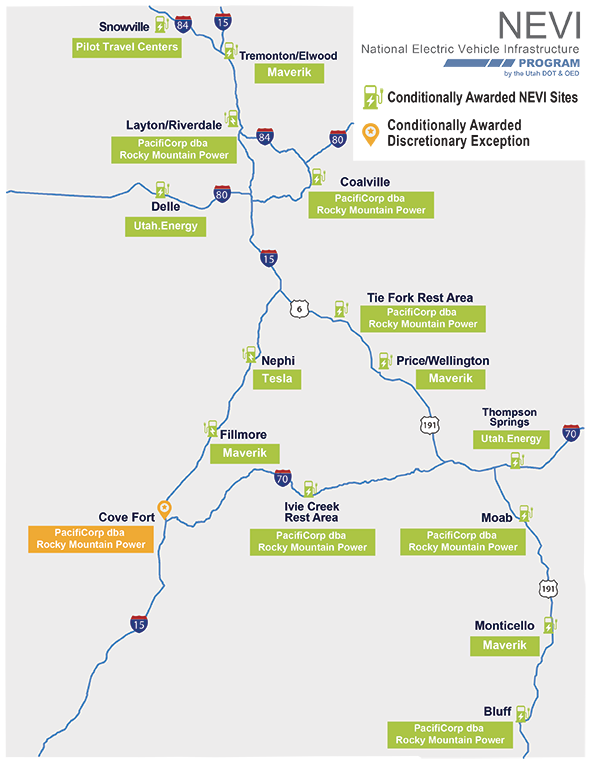UDOT to jumpstart electric vehicle infrastructure with new fast charging stations grants
November 14, 2023
New sites will double Utah’s electric vehicle fast charging network and make it easier for Utahns in electric vehicles to travel anywhere along Utah’s interstates
The Utah Department of Transportation (UDOT) will double Utah’s current fast charging capacity by the end of 2024 with 15 new sites funded through the National Electric Vehicle Infrastructure (NEVI) Formula Program. Today UDOT announced the awarding of grants through the NEVI program to build out the state’s electric vehicle charging network. By the end of next year, electric vehicle owners will be able to travel anywhere along Utah’s interstates, US-6 and US-191 with access to modern, fast chargers.
“The future is coming, and these 15 new fast charging sites will ensure Utah will be ready for it,” UDOT Executive Director Carlos Braceras said. “Building out the statewide charging network really opens the door to let Utahns choose to travel where they want, when they want, in the way they want.”
Since 2015, the number of EVs in Utah has grown by an average of 48 percent year over year, and the rate of growth is climbing. To meet this growing need, together with the Utah Office of Energy Development, UDOT advertised 15 strategic site locations. In response, private entities submitted 75 applications to match their private fund with NEVI funding. Conditional awards have been announced for the following sites:

- Snowville – Pilot Flying J Travel Center
- Tremonton – Maverik
- Layton/Ogden – Rocky Mountain Power
- Delle (I-80) – Utah.Energy
- Coalville – Rocky Mountain Power
- Nephi – Tesla
- Tie Fork – Rocky Mountain Power
- Price/Wellington – Maverik
- Fillmore – Maverik
- Ivie Creek – Rocky Mountain Power
- Moab – Rocky Mountain Power
- Thompson Springs – Utah.Energy
- Cove Fort – Rocky Mountain Power
- Monticello – Maverik
- Bluff – Rocky Mountain Power
The chargers will be owned and operated by private companies and have 24/7 availability to the public.
Creating a charging network of this magnitude requires a team effort between the federal government, the state of Utah and private businesses. Utah is receiving about $36 million in federal funding,and combined with a minimum 20% private match, the program is expected to invest a total of $43 million.
In this first phase of the program, about $17.5 million will be invested in providing the traveling public with access to fast EV charging every 50 miles along Utah’s interstate highways. No state taxpayer dollars are being used in this phase, as UDOT is entering into public-private partnerships to implement the project.



